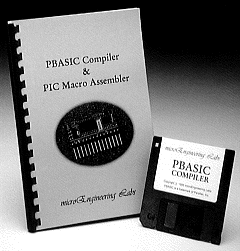
The low-cost PicBasic Compiler (PBC) makes it easy to write programs for the fast Microchip PICmicros. PBC converts these programs into hex or binary files that can be programmed directly into a PICmicro microcontroller. The easy-to-use BASIC language makes PICmicro programming available to everyone with its English-like instruction set. No more scary assembly language!
The PicBasic Compiler instruction set is compatible with the Parallax BASIC Stamp I. BS1 programs can be compiled into PICmicro code and programmed directly into a PICmicro, eliminating the need for a BASIC Stamp module. These programs execute much faster and may be longer than their Stamp equivalents. They may also be protected so no one can copy your code. Other benefits include substantial cost savings over a BASIC Stamp.
All of the PicBasic Compiler library routines act on the 8-bit PORTB of the PICmicro. PicBasic programs may use up to 2K of PICmicro code space.
The PicBasic Compiler has many features beyond the BS1. Peek and Poke instructions let you use additional PICmicro features not available on the BASIC Stamp I. These include access to PORTA, B, C, D and E (if the particular PICmicro has them), A/D converters, hardware serial ports and other on-chip features in BASIC, foregoing the need to use assembly language.
But if you really want to use assembly language instructions, they may be mixed with BASIC instructions through the use of the PicBasic Compiler's in-line assembler and Call instruction. Our PICmicro macro assembler is included and automatically invoked by the PicBasic Compiler.
The I2C commands let the PICmicro talk to external I2C devices, such as serial EEPROMs, using only a 2-wire interface. Two PORTA pins have been dedicated to the task (the particular pins assigned may be easily changed if desired) so there is no need to tie up any of the special purpose PORTB pins.
PBC has more user variables. The BS1 only provides variables from B0 - B13 and W0 - W6. The PicBasic Compiler allows variables from B0 - B79 and W0 - W39 when used with PICmicros having 96 RAM registers in bank 0 like the PIC16C622 and 16C74.
The PicBasic Compiler is a DOS command line application (it also works in Windows) and runs on PC compatibles. It can create programs for the PIC12C67x, PIC14Cxxx, PIC16C55x, 6xx, 7xx, 84, 92x and PIC16F8xx microcontrollers and works with most PICmicro programmers, including our EPIC Plus Pocket PICmicro Programmer. A printed manual and sample programs are included to get you started.
The PicBasic Compiler is also available bundled with the EPIC Plus Programmer.
 The PicBasic Compiler can now be used inside Microchip's MPLAB IDE. This allows programs to be edited and simulated within Windows. More information and the necessary files are on the MPLAB page.
The PicBasic Compiler can now be used inside Microchip's MPLAB IDE. This allows programs to be edited and simulated within Windows. More information and the necessary files are on the MPLAB page.
Current PicBasic Compiler owners can upgrade to the latest version at any time. See the upgrade page for information on how to obtain the latest version.
12C508(A), 12C509(A): Not supported because of 12-bit core.
12C671, 12C672: Supported. All Pin operations act on 6-pin GPIO port since there is no PORTB.
14C000: Supported. All Pin operations act on PORTC since there is no PORTB.
16C505, 16C52, 16C54, 16C55, 16C56, 16C57, 16C58: Not supported because of 12-bit core.
16C554(A), 16C556(A), 16C558(A), 16C61, 16C62(AB), 16C620(A), 16C621(A), 16C622(A), 16C63(A), 16C64(A), 16C641, 16C642, 16C65(AB), 16C66, 16C661, 16C662, 16C67, 16C71, 16C710, 16C711, 16C715, 16C72(A), 16C73(AB), 16C74(AB), 16C76, 16C77, 16C773, 16C774, 16C84, 16F83, 16F84(A), 16F873, 16F874, 16F876, 16F877: Supported.
PicStic1, PicStic2, PicStic3, PicStic4: Supported.